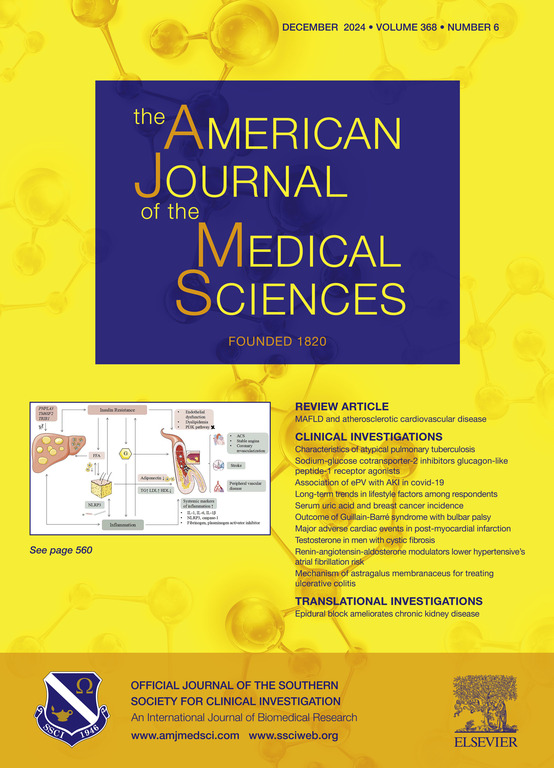可溶性 RAGE 可通过抑制白细胞介素-6 减轻心肌 I/R 损伤。
IF 2.3
4区 医学
Q2 MEDICINE, GENERAL & INTERNAL
引用次数: 0
摘要
背景:炎症反应在心肌缺血/再灌注(I/R)损伤中起着核心作用。先前的研究表明,高级糖化终产物受体(RAGE)通过与多种配体结合参与了心肌缺血再灌注损伤的促炎过程。因此,RAGE 的诱饵受体可溶性高级糖化终产物受体(sRAGE)对心肌 I/R 损伤的抑制作用可能与炎症状态的减轻有关:本研究测定了急性心肌梗死(AMI)患者和经 I/R 处理的心肌细胞特异性 sRAGE 基因敲入(sRAGE-CKI)小鼠血浆中几种炎症介质的水平。对小鼠心脏的心功能、梗塞面积和巨噬细胞表型进行了检查和记录:我们招募了 38 名被诊断为心肌梗死(AMI)的患者(平均年龄为 58.81 ± 10.40 岁)和 26 名冠状动脉造影结果阴性的对照组患者(平均年龄为 61.84 ± 8.57 岁)。结果显示,与对照组相比,AMI 患者组的 sRAGE 水平显著升高(1905.00 [1462.50, 2332.5] vs 1570.00 [1335.00, 1800.00] pg/mL,p + M1-巨噬细胞,小鼠心脏中 CD206+ M2-巨噬细胞增多):我们的研究结果表明,sRAGE 可抑制促炎性 M1-巨噬细胞的浸润,进而减少 IL-6 的分泌,从而保护心脏免受心肌 I/R 损伤。本文章由计算机程序翻译,如有差异,请以英文原文为准。
Soluble RAGE attenuates myocardial I/R injury by suppressing interleukin-6
Background
Inflammatory responses play a central role in myocardial ischemia/reperfusion (I/R) injury. Previous studies have demonstrated that the receptor for advanced glycation end-products (RAGE) is involved in the pro-inflammatory process of myocardial I/R injury by binding to diverse ligands. Thus, the inhibitory effects of soluble receptor for advanced glycation end-products (sRAGE), a decoy receptor for RAGE, on myocardial I/R injury may be associated with a reduced inflammatory state.
Methods
In this study, plasma levels of several inflammatory mediators were measured in patients with acute myocardial infarction (AMI) and I/R-treated cardiomyocyte-specific sRAGE knock-in (sRAGE-CKI) mice. Cardiac function, infarct size, and macrophage phenotypes were examined and documented in mouse hearts.
Results
We enrolled 38 patients diagnosed with myocardial infarction (AMI) [mean age, 58.81 ± 10.40 years] and 26 control with negative coronary arteriographic findings [mean age, 61.84 ± 8.57 years]. The results showed that sRAGE levels were significantly elevated in the AMI patient group compared with the control group (1905.00 [1462.50, 2332.5] vs 1570.00 [1335.00, 1800.00] pg/mL, p < 0.05), which were negatively correlated with interleukin (IL)-1, IL-6, and IL-8 levels. Cardiac-specific overexpression of sRAGE dramatically improved cardiac function and reduced infarct size during myocardial I/R. Furthermore, sRAGE overexpression decreased the plasma IL-6 levels and pro-inflammatory iNOS+ M1-macrophages, and increased CD206+ M2-macrophages in the mouse hearts.
Conclusions
Our findings suggested that sRAGE protects the heart from myocardial I/R injury by inhibiting the infiltration of pro-inflammatory M1-macrophages, and subsequently decreasing IL-6 secretion.
求助全文
通过发布文献求助,成功后即可免费获取论文全文。
去求助
来源期刊
CiteScore
4.40
自引率
0.00%
发文量
303
审稿时长
1.5 months
期刊介绍:
The American Journal of The Medical Sciences (AJMS), founded in 1820, is the 2nd oldest medical journal in the United States. The AJMS is the official journal of the Southern Society for Clinical Investigation (SSCI). The SSCI is dedicated to the advancement of medical research and the exchange of knowledge, information and ideas. Its members are committed to mentoring future generations of medical investigators and promoting careers in academic medicine. The AJMS publishes, on a monthly basis, peer-reviewed articles in the field of internal medicine and its subspecialties, which include:
Original clinical and basic science investigations
Review articles
Online Images in the Medical Sciences
Special Features Include:
Patient-Centered Focused Reviews
History of Medicine
The Science of Medical Education.

 求助内容:
求助内容: 应助结果提醒方式:
应助结果提醒方式:


